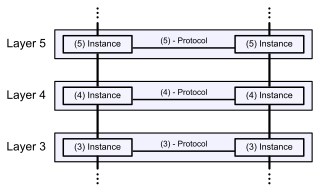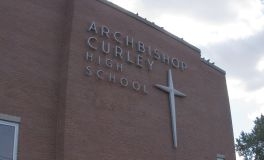
The Open Source Initiative (OSI) is the steward of the Open Source Definition, the set of rules that define open source software. It is a California public-benefit nonprofit corporation, with 501(c)(3) tax-exempt status.

The Open Systems Interconnection (OSI) model is a reference model from the International Organization for Standardization (ISO) that "provides a common basis for the coordination of standards development for the purpose of systems interconnection." In the OSI reference model, the communications between systems are split into seven different abstraction layers: Physical, Data Link, Network, Transport, Session, Presentation, and Application.

David Baltimore is an American biologist, university administrator, and 1975 Nobel laureate in Physiology or Medicine. He is a professor of biology at the California Institute of Technology (Caltech), where he served as president from 1997 to 2006. He founded the Whitehead Institute and directed it from 1982 to 1990. In 2008, he served as president of the American Association for the Advancement of Science in 2008.
Open Society Foundations (OSF), formerly the Open Society Institute, is a US-based grantmaking network founded by business magnate George Soros. Open Society Foundations financially supports civil society groups around the world, with the stated aim of advancing justice, education, public health and independent media. The group's name was inspired by Karl Popper's 1945 book The Open Society and Its Enemies.
The ISODE software, more formally the ISO Development Environment, was an implementation of the OSI upper layer protocols, from transport layer to application layer, which was used in the Internet research community to experiment with implementation and deployment of OSI during the late 1980s and early 1990s.
An urban debate league (UDL) is a group of high school policy debate teams from urban high schools in the United States. UDLs are generally located in large cities throughout the United States and work predominantly with minority students.
Alternative terms for free software, such as open source, FOSS, and FLOSS, have been a controversial issue among free and open-source software users from the late 1990s onwards. These terms share almost identical licence criteria and development practices.
The Open Society Initiative for West Africa (OSIWA) is an organization in West Africa. OSIWA was established in 2000 as a part of the global network of Soros Foundations. OSIWA claims to promote "open societies where democracy, good governance, the rule of law, basic freedoms and widespread civic participation prevail" and "the value of cooperation with similarly minded groups and governments". It is one of numerous Open Society Foundations founded by business magnate and billionaire George Soros around the globe.

Archbishop Curley High School is a Roman Catholic boys' high school in the Roman Catholic Archdiocese of Baltimore in the United States, within the City of Baltimore. It is affiliated with the Conventual Franciscan religious order. It is the brother school to the neighboring girls' school, The Catholic High School of Baltimore.
The Barkley Forum is the intercollegiate debate and forensics organization at Emory University. It is named after Emory alumnus and former United States Vice-President Alben W. Barkley. Debate at Emory began in the 1830s. The literary societies that practiced literary and forensic arts gave way to an intercollegiate debating society in the 1920s.

The Office of Research Integrity (ORI) is a U.S. government agency that focuses on research integrity, especially in health. It was created when the Office of Scientific Integrity (OSI) in the National Institutes of Health (NIH) and the Office of Scientific Integrity Review (OSIR) in the Office of the Assistant Secretary for Health merged in May 1992. The Office of Research Integrity oversees and directs Public Health Service (PHS) research integrity activities on behalf of the Secretary of Health and Human Services, except for the regulatory research integrity activities of the Food and Drug Administration. Organizationally, ORI is located within the Office of the Assistant Secretary for Health (OASH) within the Office of the Secretary of Health and Human Services (OS), in the Department of Health and Human Services (HHS).
Open Space Institute (OSI) is a conservation organization that protects land for clean drinking water, public recreation, healthy communities, wildlife habitat, and climate protection. Established in 1974, OSI achieves its goals through land acquisition, fiscal sponsorship, regional loan and grant programs, park and trail improvements, and public policy and advocacy. OSI is active across the country, including the states of New York, Vermont, New Hampshire, Maine, Georgia, South Carolina, Virginia, Tennessee, New Jersey, Massachusetts, Pennsylvania, Alabama, West Virginia, North Carolina, and Florida.
Open Society Initiative for Southern Africa (OSISA) is a Southern African organization which "collaborates with other organizations on issues surrounding the rule of law, democracy building, human rights, economic development, education, the media, and access to technology and information. The initiative's varied activities share a common goal of reducing poverty, HIV/AIDS, and political instability." OSISA's director for Zimbabwe is Godfrey Kanyenze, who also directs the Zimbabwe Congress of Trade Unions (ZCTU), which was the main force behind the founding of the Movement for Democratic Change, the principal indigenous organization promoting regime change in Zimbabwe.
Woodstock is an unincorporated community which is a suburb of Baltimore, Maryland, United States. The original village of Woodstock is located in Howard County, and also includes portions of Baltimore County and Carroll County.

Luis Villa is an American attorney and programmer who worked as Deputy General Counsel and then as Senior Director of Community Engagement at the Wikimedia Foundation. Previously he was an attorney at Mozilla, where he worked on the revision of the Mozilla Public License (MPL). He continued that work in his next job at Greenberg Traurig where he was part of the team defending Google against Oracle's claims concerning Android. Prior to graduating from Columbia Law School in 2009, he was an employee at Ximian, which was acquired by Novell in 2003. He spent a year as a "senior geek in residence" at Harvard's Berkman Center for Internet & Society working on StopBadware.org. He has been elected four times to the board of the GNOME Foundation. He was editor-in-chief of the Columbia Science and Technology Law Review, and blogs regularly. He was a director of the Open Source Initiative from April 2012 to March 2015.
The open-source-software movement is a movement that supports the use of open-source licenses for some or all software, as part of the broader notion of open collaboration. The open-source movement was started to spread the concept/idea of open-source software.

Baltimore is the most populous city in the U.S. state of Maryland. With a population of 585,708 at the 2020 census, it is the 30th-most populous city in the United States. Baltimore was designated an independent city by the Constitution of Maryland in 1851, and is currently the most populous independent city in the nation. As of the 2020 census, the population of the Baltimore metropolitan area was 2,838,327, the 20th-largest metropolitan area in the country. When combined with the larger Washington metropolitan area, the Washington–Baltimore combined statistical area (CSA) has a 2020 U.S. census population of 9,973,383, the third-largest in the country.
The Shared Source Initiative (SSI) is a source-available software licensing scheme launched by Microsoft in May 2001. The program includes a spectrum of technologies and licenses, and most of its source code offerings are available for download after eligibility criteria are met.
The Protocol Wars were a long-running debate in computer science that occurred from the 1970s to the 1990s, when engineers, organizations and nations became polarized over the issue of which communication protocol would result in the best and most robust networks. This culminated in the Internet–OSI Standards War in the 1980s and early 1990s, which was ultimately "won" by the Internet protocol suite (TCP/IP) by the mid-1990s when it became the dominant protocol suite through rapid adoption of the Internet.






